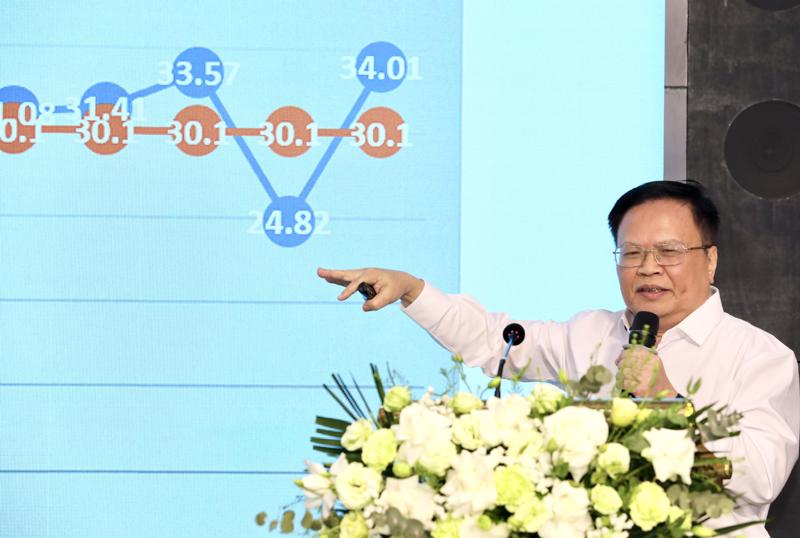Amidst a positive atmosphere at the discussion with the theme of Economic outlook for the first quarter: "Opening the way" for the economy in 2024, Dr. Nguyen Dinh Cung, former head of the Central Institute for Economic Management (CIEM), under the Ministry of Planning and Investment, put on a more somber tone as he pointed out the various barriers that can plague the Vietnamese economy in 2024.
"For me, as someone who has been an economic researcher for the past 30 years, witnessing many reforms that the economy has gone through, I can say that this era is the most troubling and we can look at the current situation with such optimism," he emphasized at the discussion.
Positive signs due to a low baseline in 2023
Dr. Cung stated that one of the main reasons the Vietnamese economy is recording such positive signs of growth in the first quarter of this year is due to the very low baseline at the same time last year.
"After January with a record GDP growth of 18%, the economy declined in February due to the effects of Tet. However, in March, GDP growth only reached 4.1%. Furthermore, the Purchasing Managers' Index (PMI) also decreased in the same month," the economic expert pointed out. "These are signs of instability in the economic development of Vietnam," he added.
In trade activities, he reasoned that one of the main factors that caused import/export value to jump 17% in the first quarter of 2024 was because this sector of the economy was declining during most of 2023.
"Trade turnover mostly maintained at $30 billion between 2022 - 2024 with value edging above $34 billion in March. Although I doubt this number will go above $34 billion in the coming months, even slightly decreasing in some periods," Dr. Cung predicted.
He noted that as an export-oriented economy, Vietnam's industrial sector is heavily reliant on trade activities. With trade turnover leveling off at current levels, the recovery process in industrial production of Vietnam can't be accelerated.
Higher inflation rate affecting the service sector
Services have also been a rapidly developing sector and a growth driver of the economy. However, since the 3rd quarter of 2022, this industry has been on a decline in 3 indicators, namely the growth in value added, growth in value without accounting for price changes, and growth accounting for price changes.
By the first quarter of this year, the growth in value added was recorded at 6.1% and 5.1 percent when accounting for price changes, lower than the data recorded before the pandemic.
"I believe these numbers will decrease even more due to the higher inflation rate without any changes to wages of workers. The people won't have any excess income to spend on services," Dr. Cung predicted.
Decrease in investmentsPublic investment, a major driving force of the economy, has seen a marked decrease in the first quarter of 2024 compared to the previous quarter. According to data from the General Statistics Office of Vietnam, public investment in the first quarter of this year was estimated at VND162.7 trillion ($6.4 billion), significantly lower than the VND320.8 trillion ($12.6 billion) invested in the last quarter of 2023.
"Private investment activities haven't fully recovered. In the past, most private investments were concentrated in the gold market with a growth rate ranging between 13-15%. Now it is only above 4.2% in the first quarter," Dr. Cung shared. "Private investment accounts for 55-60% of total social investment capital," he added.
While recognizing that foreign direct investment (FDI) has increased, the economic expert noted that it hasn't surpassed the $39 billion mark in 2019, with FDI investment in 2023 coming in at $36 billion. "The future of FDI investments in Vietnam, which has long been considered one of the most important factors affecting the performance of our economy, is not so bright," he concluded.
Next, total investment capital, Dr. Cung noted that the disbursement of registered capital has not been carried out effectively as the average scale of each FDI project since 2015 has been lower than the average investment in the years prior to that.
"Lower investment in each project means there won't be a transfer of technology to Vietnam. These projects will only concentrate on the final stages in the manufacturing process," he analyzed.
Breakthroughs needed
According to Dr. Cung, in the long run, if Vietnam doesn't find a breakthrough in its economic development but only relies on the increase in FDI, it won't be able to achieve its target of becoming a high-income country.
"Vietnam needs a turning point in its economic development process. To achieve this, we need a comprehensive overhaul in the legal framework instead of the incremental changes that are being implemented at the moment," he emphasized. "Without these revolutionary changes in the legal framework, Vietnam won't be able to reach its economic development target," Dr. Cung concluded.
Expert identifies growth barriers of Vietnam's economy in 2024
Troubling signs of the economy are pointed out at an event hosted by VnEconomy/Vietnam Economic Times and the University of Economics and Business, under the Vietnam National University (VNU).









 Google translate
Google translate